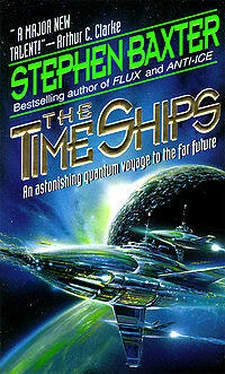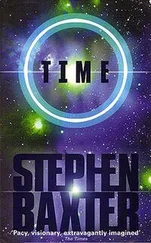The Dome reached its greatest height of two hundred feet or so directly above Westminster at the heart of London; as we neared the center of town, I saw beams of brilliant lights flickering up from the central streets and splashing that universal Roof with illumination. And everywhere, protruding from the streets of London and from immense foundation-rafts on the river, there were those pillars: rough-hewn, crowding, with splayed and buttressed bases — ten thousand concrete Atlases to support that roof, pillars which had turned London into an immense Moorish temple.
I wondered if the basin of chalk and soft clay in which London rested could support this colossal weight! What if the whole arrangement were to sink into the mud, dragging its precious cargo of millions of lives with it? I thought with some wistfulness of that Age of Buildings which was to come, when the glimpses I had seen of the mastery of gravity would render a construction like this Dome into a trivial affair…
Yet, despite the crudity and evident haste of its construction, and the bleakness of its purpose, I found myself impressed by the Dome. Because it was all hewn out of simple stone and fixed to the London clay with little more than the expertise of my own century, that brooding edifice was more remarkable to me than all the wonders I had seen in the Year A.D. 657,208!
We traveled on, but we were evidently close to journey’s end, for the train moved at little more than walking pace. I saw there were shops open, but their windows were scarcely a blaze of light; I saw dummies wearing more of the drab clothes of the day, and shoppers peering through patched-up glass panes. There was little left of luxury, it seemed, in this long and bitter War.
The train drew to a halt. “Here we are,” said Bond. “This is Canning Gate: just a few minutes’ walk to Imperial College.” Trooper Oldfield pushed at the carriage door — it opened with a distinct pop, as if the pressure in this Dome were high — and a flood of noise burst in over us. I saw more soldiers, these dressed in the drab olive battle-dress of infantrymen, waiting for us on the platform.
So, grasping my borrowed gas-mask, I stepped out into the London Dome.
The noise was astonishing! — that was my first impression. It was like being in some immense crypt, shared with millions of others. A hubbub of voices, the squealing of train wheels and the hum of trams: all of it seemed to rattle around that vast, darkened Roof and shower down over me. It was immensely hot — hotter than the Raglan had been. There was a warm array of scents, not all of them pleasant: of cooking food, of ozone from some machinery, of steam and oil from the train — and, above all, of people, millions of them breathing and perspiring their way through that great, enclosed blanket of air.
There were lights placed here and there in the architecture of the Dome itself not enough to illuminate the streets below, but enough that one could make out its shape. I saw little forms up there, fluttering between the lights: they were the pigeons of London, Filby told me — still surviving, though now etiolated by their years of darkness — and the pigeons were interspersed with a few colonies of bats, who had made themselves unpopular in some districts.
In one corner of the Roof, to the north, a projected light-show was playing. I heard the echoing of some amplified voice from that direction, too. Filby called this the “Babble Machine” — it was a sort of public kinematograph, I gathered — but it was too remote to make out any details.
I saw that our new light rail track had been gouged, quite crudely, through the old road surface; and that this “station” was little more than a splash of concrete in the middle of Canning Place. Everything about the changes which had wrought this new world spoke of haste and panic.
The soldiers formed up into a little diamond around us, and we walked away from the station and along Canning Place towards Gloucester Road. Moses had his fists clenched. In his bright-colored masher’s costume he looked scared and vulnerable, and I felt a pang of guilt that I had brought him to this harsh world of metal epaulets and gas-masks.
I glanced along De Vere Gardens to the Kensington Park Hotel, where I had been accustomed to dine in happier times; the pillared porticoes of that place still stood, but the front of the building had become shabby, and many of the windows were boarded up, and the Hotel appeared to have become part of the new railway terminus.
We turned into Gloucester Road. There were many people passing here, on the pavement and in the road, and the tinkling of bicycle bells was a cheerful counterpoint to the general sense of despondency. Our tight little party — and Moses in his gaudy costume in particular were treated to many extended stares, but no body came too close, or spoke to us. There were plenty of soldiers hereabouts, in drab uniforms similar to those of the ’Naut crew, but most of the men wore suits which — if rather plain and ill-cut — would not have looked out of place in 1891. The women wore delicate skirts and blouses, quite plain and functional, and the only source of shock in this was that most of the skirts were cut quite high, to within three or four inches of the knee, so that there were more feminine calves and ankles on display in a few yards than, I think, I had ever seen in my life! (This latter was not of much interest to me, against the background of so much Change; but it was, apparently, of rather more fascination to Moses, and I found the way he stared rather ungentlemanly.)
But, uniformly, all the pedestrians wore those odd metal epaulets, and all lugged about, even in this summer heat, heavy webbing cases bearing their gas-masks.
I became aware that our soldiers had their holsters open, to a man; I realized that the weapons were not intended for us, for I could see the thin eyes of the soldiers as they surveyed the crush of people close to us.
We turned east along Queen’s Gate Terrace. This was a part of London I had been familiar with. It was a wide, elegant street lined by tall terraces; and I saw that the houses here were pretty much untouched by the intervening time. The fronts of the houses still sported the mock Greco-Roman ornamentation I remembered — pillars carved with floral designs, and the like — and the pavement was lined by the same black-painted area rails.
Bond stopped us at one of these houses, halfway along the street. She climbed the step to the front door and rapped on it with a gloved hand; a soldier — another private, in battle-dress — opened it from within. Bond said to us, “All the houses here were requisitioned by the Air Ministry, a while ago. You’ll have everything you need — just ask the privates — and Filby will stay with you.”
Moses and I exchanged glances. “But what are we to do now?” I asked.
“Just wait,” she said. “Freshen up — get some sleep. Heaven knows what hour your bodies think it is!… I’ve had instructions from the Air Ministry; they are very interested in meeting you,” she told me. “A scientist from the Ministry is taking charge of your case. He will be here to see you in the morning.
“Well. Good luck — perhaps we’ll meet again.” And with that, she shook my hand, and Moses’s, in a manly fashion, and she called Trooper Oldfield to her; and they set off down the Mews once more, two young warriors erect and brave — and every bit as fragile as that War-Burned wretch I had seen earlier in Kensington High Street.
[4]
The House in Queen’s Gate Terrace
Filby showed us around the house. The rooms were large, clean and bright, though the curtains were drawn. The house was furnished comfortably but plainly, in a style that would not have seemed out of place in 1891; the chief difference was a proliferation of new electrical gadgets, especially a variety of lights and other appliances, such as a large cooker, refrigerating boxes, fans and heaters.
Читать дальше
Конец ознакомительного отрывка
Купить книгу









